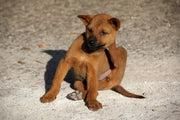Do Dogs Dream? Yep, They Sure Do!
If you’ve ever wondered whether your dog’s twitching paws and muffled yips mean your dog is dreaming, you are not alone. Do dogs dream? was one of Google’s top search questions relating to dogs in 2014 and if you start entering ‘do dogs….’ in Google’s search box, dream? will pop up right at the top of the list of search results.
MIT Scientists Discover That Rats Dream
Scientists have also been intrigued by the question and their studies have revealed some interesting discoveries about animals and their dreams. Mathew Wilson is a neuroscientist at MIT who has been getting inside the heads of rats for some time. His 2001 study (conducted with the help of Kenway Louie, his graduate assistant) monitored brain waves of rats who were trained to stop every now and then to get a treat while running around a circular track. Each rat generated predictable brain wave patterns in the area of the hippocampus, where memories and learning are thought to occur.
What’s fascinating, though, is that during the night when the rats were sleeping, those same patterns of neuronal activity were repeated. They were so consistent and recognisable, that Kenway and Wilson were even able to tell exactly where the rats were in their dream versions of the maze.
Why do dogs bark?
Dreams, Dogs and REM Sleep
These findings suggest that rats (and humans, of course) are not the only mammals that have dreams. Dreams occur during a phase of sleep where the eyes move back and forth, aptly named Rapid Eye Movement (REM) sleep. Many mammals, including dogs, experience REM sleep. In fact, if you watch your sleeping dog carefully, you’ll notice that about 20 minutes after your dog falls asleep his eyes will begin to move behind his eyelids. This is also the point at which scientists like Dr. Stanley Coren, a psychology professor at the University of British Columbia and author of Do Dogs Dream: Nearly Everything Your Dog Wants You to Know, believes your dog begins to dream.
Coren’s observations have led him to think that dogs dream about the stuff they do every day and there’s some science to support that idea. Just like in humans, there is a part of the brain in dogs that gets activated during sleep that stops them from acting out what they are doing during their dreams. Though the exact mechanism is still being investigated, what’s known is that if you remove or deactivate structures like the pons, dogs will act out whatever they appear to be dreaming about. Coren describes how this type of research suggests that sleeping Pointers will be pointing at game and Dobermans will be going after a burglar.

Dog Sprints Off While Sound Asleep
Sometimes, dog dreams appear to be quite vivid. Have a look at this video that captures a dreaming dog chasing after something enticing (or, fleeing for his life!).
Age Affects Dogs Acting Out Their Dreams
Other observations reveal that puppies (with their underdeveloped brains) and elderly dogs (where brain function is no longer quite so efficient) are more likely to physically twitch and act out their dreams because those impulses are not so effectively suppressed. Interestingly, this pattern is also seen in infants and older people.
Different Sizes of Dogs Dream Differently
One interesting difference between humans and dogs noted by Dr. Coren, when it comes to dream patterns, is that small dogs seem to have shorter but more frequent dreams but larger dogs have longer dreams and fewer of them.
Dogs Hard-Wired to Recognise Human Faces
Some studies suggest that certain areas of dogs’ brains light up when they see photos of human faces. Perhaps at some point researchers will be able to pinpoint how often our dogs have fond dreams about us. My guess is, if you notice your dog drooling during a dream cycle, your dog may well be dreaming about a great meal prepared by Rawmate. Actually, that’s a great idea for a future study, don’t you think?
If you’ve observed your dog dreaming, we’d love to hear about it. Post a video of your dog dreaming on Instagram and use the hashtag #rawmatepack so we can find it.







There are 0 Comments